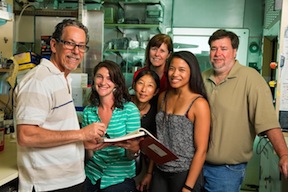Daily Business Report-Sept. 26, 2014
A drone with a Go Pro camera mounted underneath.
San Diego Company Gets FAA
Approval to Film Using Drones
The Federal Aviation Administration has given San Diego-based Aerial Mob and five other companies license to use drones on movie and television shoots. The administration announced regulatory exemptions Thursday outlining a legal way for these companies to use drones in scripted film production.
Aerial Mob’s Tony Carmean says his company has been lobbying the FAA for close to a year now with help from the Motion Picture Association of America.
“We set the rules for how to use unmanned aerial systems safely on movie sets,” Carmean said. “That’s the biggest piece of what we accomplished today.”
Aerial Mob, a 2-year-old company with four full-time staffers, has experience filming with drones outside the United States. Carmean said just last week they were in Mexico City for five days shooting a commercial for Mexican cell phone service provider Movistar.
“Now we don’t have to go outside the United States’ borders to do our work,” said Carmean.
Carmean expects to begin taking on contracts for commercial and movie shoots in California soon.
But the six companies granted FAA exemptions still have to follow strict rules. They can’t film over crowds, fly above 400 feet or work on reality television projects. And all filming must be confined within restricted, controlled areas.
Carmean says the FAA might have taken a long time to approve these exemption, but for good reason.
“The FAA has a terribly daunting task,” he said. “They decided to take baby steps and choose the industries that have the least amount of privacy and safety issues.”
The decision marks a major step for the FAA, which has so far banned nearly all commercial use of drones.
— KPBS
Construction & Real Estate Report

Wermers Properties to Build Apartments in Carmel Valley
Wermers Properties in partnership with R&V Management has acquired 7.4 acres in Carmel Valley with plans to develop an apartment community within the Village at Pacific Highlands Ranch. The Village at Pacific Highlands Ranch is a mix-use complex with 331 apartment homes and approximately 175,000 square feet of retail and dining space. The seller of the land site is Pacific Highlands Ranch Village LLC.
Construction on the apartments should begin in late 2015 with occupancy targeted for spring of 2017. In addition to the retail and dining options, apartment residents will have access to onsite amenities, including a resort-style pool, spa, pet grooming facilities and a dog walk, tot lot, and a fourth floor roof deck overlooking the pool where residents can take in views of the Santa Monica mountains.

Westcore Properties Acquires
Otay Mesa Building for $6.7 Million
Westcore Properties has purchased a vacant, 104,180-square-foot building at 8917 Kerns St. in Otay Mesa for $6.7 million and intends to market it for a large industrial operation. The property, located lesss than a mile from the Otay Mesa Port of Entry, was initially developed by Murphy Development as a ground-up, build-to-suit project for Kojima America, which used it to manufacture back panels for plasma and LCD televisions. Ironically, Hack Adams, now senior vice president with Westcore Properties, was part of the development team that constructed the property.
The seller was Dominion Investments (Kojima America)/C&W of San Diego. Cushman & Wakefield was the broker in the sale.

Construction Starts on 2 Mesa College Buildings
More than 150 faculty members, staff, contractors, and San Diego Community College District representatives turned out Thursday to kick off the beginning of construction of The Mesa Commons and the Exercise Science Center at Mesa College. The two new buildings will make up Sunrise Plaza, the new front door to the campus.
Funded by Proposition N and scheduled for completion in 2015, the new $44.3 million Mesa Commons will consist of a two-story, 60,000-square-foot building that will house campus food services, a bookstore, coffee bar, convenience store, campus stockroom, faculty/staff reprographic services, auxiliary conference rooms, and the culinary arts/culinary management program — including a student-run restaurant and rooftop garden. The building’s design features sustainable elements including natural ventilation, solar water heating, radiant floor heating, storm water harvesting, and daylighting.
The state-of-the-art, $15.3 million Exercise Science Center, funded by Proposition S, will be a two-story, 27,200-square-foot steel structure to be occupied by the Mesa College Athletics Department. The contemporary center will include an aerobics studio, weight training room, spinning room, free weight training lab, athletic training room, a wet lab with whirlpools and icing stations to treat injuries, cardio fitness training lab, and an office suite.
The design-build team on both projects is Balfour Beatty Construction/gkkworks.

UC San Diego Breaks Ground
On The New Triton Ballpark
UC San Diego broke ground Thursday on the new Triton Ballpark, the next step in changing the existing field into a state-of-the-art facility for the university’s intercollegiate baseball team. The ballpark will include sunken team dugouts, a press box, an area for food trucks, permanent spectator seating and restrooms. Construction is projected for more than $6 million.
The Marye Anne Fox Clubhouse will be named in honor of the woman who, during her tenure as chancellor from 2004 to 2012, was an advocate for athletics and championed updates to the baseball field — which ultimately set the foundation for construction of Triton Ballpark.
Lead donors on the ballpark project include Bill Scripps, Gary Jacobs, a 1979 UC San Diego graduate, John Moores, Malin Burnham and Richard Atkinson, UC San Diego’s fifth chancellor.
“We are creating our own ‘field of dreams’ for our students, the campus and our community,” said Chancellor Pradeep K. Khosla.
Two architectural firms, Gensler and Populous, worked on the design of Triton Ballpark. Populous, which helped create Petco Park, home to the San Diego Padres, formulated the initial concept, while Gensler is executing the project to completion.
*****************************
Workforce Partnership Gets $6 Million Grant
The San Diego Workforce Partnership was awarded a $6 million federal grant to improve job training programs. The award was one of 11 handed out nationwide, for a total of $50.7 million, the U.S. Department of Labor announced. The San Diego Workforce Partnership provides job training and workshops, operates career centers, collects local employment data and runs a summer jobs program for youth.
The partnership runs job centers at the Downtown library, in City Heights, Mountain View, Serra Mesa, Grant Hill, Chula Vista, Bonita, El Cajon and Spring Valley.
Grantees will work with local and regional employers, industry groups and their state commerce and development agencies to strengthen public-private partnerships, according to the Labor Department. In addition, all grants require an evaluation component that will help to increase the body of knowledge about the most effective strategies in workforce development.
— City News Service
Scripps Scientists Creating
Artificial Immune System
Scientists from both campuses of the Scripps Research Institute are developing an artificial immune system, thanks to a $7.9 million Department of Defense grant — the Defense Advanced Research Projects Agency (DARPA). The artificial system will be used to detect or neutralize an array of biological and chemical threats.
The two teams will build what is, in essence, an artificial immune system, comprising vast “libraries” of different types of molecules from which will emerge individual compounds to detect or neutralize an array of biological and chemical threats.
Under the auspices of DARPA’s new Fold F(x) Program, the Scripps’ Jupiter, Fla. team, led by Professor Tom Kodadek and Assistant Professor Brian Paegel, will receive $5.7 million; the La Jolla team, led by Professor Floyd Romesberg, will receive $2.2 million.
In La Jolla, Romesberg and his colleagues will develop variants of oligonucleotides — short, single-stranded DNA or RNA molecules –modified to be both stable and to have increased functionality.

Modified Vitamin D Shows Promise
As Treatment for Pancreatic Cancer
Scientists at the Salk Institute found that a vitamin D derivative makes tumors vulnerable to chemotherapy. The discovery has already led to human trials for pancreatic cancer, in advance of the research’s publication today in the journal Cell.
By attacking a wound repair mechanism called fibrosis, the findings may also have implications for other tough-to-treat tumors, such as lung, kidney and liver cancer, the researchers said.
“While the success of this drug in humans with pancreatic cancer is still unclear, the findings in animal studies were strong, raising hope that ongoing clinical trials will give people with this terrible disease hope for a truly new type of therapy,” says Ronald Evans, director of Salk’s Gene Expression Laboratory and senior author of the new paper.
Pancreatic cancer is one of the deadliest forms of cancer, a fact highlighted in recent years by the deaths of well-known figures such as Steve Jobs and Patrick Swayze. About 46,000 people are diagnosed in the United States each year and about 40,000 people die from the disease, according to the National Institutes of Health.
Personnel Moves
Debora Rodriguez Takes Leadership
Post at Jewish Family Service

Jewish Family Service has named Debora Rodriguez as the organization’s new chief advancement officer. Rodriguez is the agency’s first CAO, overseeing fundraising, institutional giving, marketing and volunteers. engagement.
Rodriguez is returning to San Diego after 20-plus years in Cleveland, where she most recently served as chief executive officer of Recovery Resources.
She has worked in the nonprofit world of health and human services for more than 25 years and counts long-range planning, business planning, operations management, staff development, advocacy, and fund development as areas of expertise.
Rodriguez received her bachelor’s degree from Indiana University and a master’s degree from Bowling Green State University.
Brian Anderson Appointed to
State Board of Mining and Geology
Brian Anderson, 50, of Carlsbad, has been appointed to the State Board of Mining and Geology by Gov. Brown. Anderson has been vice president of property permitting and environment at Vulcan Materials Co. since 2013, where he has held several positions since 2002, including director of environment, regulatory affairs and sustainable development, environmental affairs manager and area resources manager. He held several positions at Brown and Caldwell Inc. from 1994 to 2002, including program leader, operations manager and senior project manager. Anderson earned a Master of Science degree in geological sciences from the University of California, Riverside. The position requires Senate confirmation and the compensation is $100 per diem. Anderson is a Republican.
Mark Weston Elected Chairman of
S.D. County Water Authority Board

Mark Weston, who represents the city of Poway on the San Diego County Water Authority’s board of directors, was elected chairman of the board Thursday, replacing Thomas Wornham, a retired bank executive, who held the post for the past two years. Mark Muir, representing the San Dieguito Water District, will serve as vice chair. New Secretary Jim Madaffer is a board representative from the city of San Diego.
Weston said the Water Authority will keep insisting that the region’s largest water supplier — the Los Angeles-based Metropolitan Water District of Southern California — stop overcharging San Diego County ratepayers and set legal rates that reflect the cost of service.
“The Water Authority won the first phase of our rate lawsuits against MWD when the judge said MWD’s rates don’t comply with state law,” Weston said. “We will continue pressing MWD to return tens of millions of dollars in overcharges as we fight for it to set legal rates in the future.”
Weston joined the Water Authority board in December 2011.
Paul Lafrenz Joins Colliers International

Paul Lafrenz is joining Colliers International as senior vice president providing clients consultative brokerage services in the acquisition and disposition of investment and owner/user properties. Lafrenz has 33 years of commercial real estate industry experience from his tenure at CBRE focusing on office, medical, retail, industrial, and NNN investment properties.
He is a graduate of Vanderbilt University where he earned a bachelor’s degree. He is a former U.S. Navy pilot.


